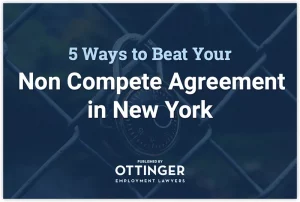
New York non-compete agreements are widely abused and overused.
Most of them are not enforceable because New York disfavors them. New York courts will only enforce them in only very rare limited situations.
As explained more below, we are able to defeat most non-compete agreements by using the Legitimate Business Interests Test. A court will only enforce a non-compete agreement if the company can satisfy this test and most companies cannot do so.
In this post, we’ll lay out what New York law says about non-compete agreements, review five effective tactics that employees can use to invalidate one, and explain how workers can seek support in overcoming their employer’s non-compete agreement.

Workers in New York have successfully used a number of tactics to prove that their employers’ non-compete agreements are unenforceable.
Here are some of the arguments that most commonly help invalidate these agreements in court.
If your employer is not willing to employ you, courts generally will not enforce a non-compete agreement. This is almost black letter law in New York, so if you were fired without cause, your non-compete agreement is not enforceable.
An employer cannot enforce a non-compete agreement against an employee unless it can demonstrate a legitimate interest that needs to be protected. In most cases, the only legitimate interest that justifies the enforcement of a non-compete clause is a trade secret.
This means that your non-compete agreement is not enforceable unless your company has trade secrets, and you know about them.
Fortunately, very few people have actual knowledge of a company’s trade secrets, which makes many non-compete agreements unenforceable. Courts don’t want to lock talented employees out of their fields unless there is a very good reason to do so.
A non-compete agreement is a legal contract. But your employer cannot legally enforce an agreement that it breached itself.
Your non-compete is probably part of your employment agreement. Has your employer violated any of its promises?
Read through your employment contract carefully to determine if your employer has breached any terms, which could be grounds for invalidating the agreement.
The Janitor Rule is a tool used by courts to void non-compete agreements that are so broad that they’d prevent an employee from working with a competitor even in an unrelated role, e.g. as a janitor.
For example, a speech therapist in a 2016 case (Reading & Language Learning Center v. Sturgill) was prohibited from working with “any current client” for two years.
Because the agreement technically barred the therapist from working in any capacity, a court threw it out for being too broad.
If you are facing a non-compete issue, take a look at your agreement. Does it narrowly tailor the restrictions, so it relates directly to your position with the company? Or does it prevent you from working for a competitor in any manner, including working as a janitor?
A non-compete agreement cannot be enforced unless your employer proves that you are competing. Compare the product or service of your new employer with your prior employer.
If not, it’s arguable that the agreement isn’t valid.
Non-compete agreements can undermine your future career prospects. It’s critical that you carefully review and consider the long-term implications of these agreements before you sign one.
If you are contemplating entering into a non-compete agreement or fighting enforcement of an agreement, having the support of experienced employment attorneys is essential.
Ottinger Employment Lawyers has drafted, reviewed, and negotiated non-compete agreements in New York for over 20 years. We offer a non-compete review and consultation to help you understand your options.
Get in touch today to speak with someone about the details of your case and how we can help you with your non-compete agreement. You can also call us at 866-399-5033.
Speak with an Employment Attorney About Your Non-Compete AgreementIf you are looking for immediate help with a non-compete issue complete the short form below to get your consultation started. We review your non-compete agreement and then meet with you over the phone. We will assess the agreement’s enforceability and suggest strategies.
Call 347-492-1904 to speak with Robert Ottinger if you have questions regarding your non-compete agreement in New York. Schedule your consultation today.

Robert Ottinger is an employment attorney who focuses on representing executives and employees in employment disputes. Before starting his firm, Robert slugged it out in courtrooms trying cases for the government. Robert served as a Deputy Attorney General for the California Department of Justice in Los Angeles and then as Assistant Attorney General for the New York Attorney General’s Office in Manhattan.